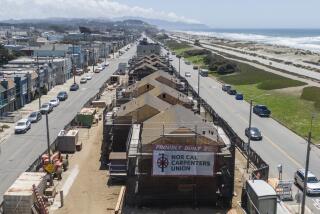Realtors group forecaster sees slowdown in ’06
- Share via
SAN FRANCISCO — America’s historic real estate boom is cresting, and the rate at which home prices appreciate should begin to slow significantly next year, according to the chief economic forecaster for the National Assn. of Realtors.
It was the closest yet to an admission by the real estate industry that the bull market for housing may have run its course.
“It’s the peak of the boom,” David Lereah said at the trade group’s annual meeting, which ended here Monday. “But we’re looking at a soft landing next year. I can’t guarantee that there won’t be some hard landings in some markets, where prices will actually decline. In fact, there will probably be two or three over the next two years that do pop.”
If Lereah’s prediction is correct, the national economic impact will be significant.
For several years, real estate prognosticators -- including home buyers and sellers -- have watched prices rise and wondered when the era of extraordinary appreciation might end.
In many markets, there has been speculation that the boom could turn into an unsustainable bubble that might eventually pop, causing prices to fall.
Lereah did not see that happening on a national scale, but a real estate market at the peak of its boom doesn’t continue to skyrocket. It moderates or drops.
The NAR’s prediction represents an acknowledgement that this could be the end of a joyride that has allowed many in the industry to prosper. To make that statement at the real estate industry’s convention -- an annual celebration of its role in driving the economy -- represented a break from the usual mood.
With average 30-year mortgage rates expected to reach 6.7% by the end of 2006, Lereah predicted that: Existing-home sales will decline 3.5% next year, to 6.9 million, from this year’s projected 7.1 million; new-home sales will fall 4.5%; home price growth should slow significantly, with 2005’s median 12.4% appreciation slowing to 5.3% in 2006.
Lereah’s predictions were for the nation as a whole.
The housing market can thank historically low mortgage-interest rates for a multiyear hot streak. Conversely, rising mortgage rates -- now more than half a point higher than a year ago -- can be expected to cut housing demand because they carry higher monthly payments. Like all interest rates, mortgages rise and fall based upon broad economic factors rather than strictly on consumer demand.
Chris Huecksteadt, who runs the regional office of Metrostudy, a national consultant for the home-building industry, said the NAR prediction of a “modest cooling” is a fair description, though rosier than his own analysis of existing-home sales dropping 7% and new-home sales declining by 12%.
“A downturn the likes of what the NAR is predicting would be almost ideal,” said Richard DeKaser, chief economist for National City Bank in Cleveland.
More to Read
Inside the business of entertainment
The Wide Shot brings you news, analysis and insights on everything from streaming wars to production — and what it all means for the future.
You may occasionally receive promotional content from the Los Angeles Times.










